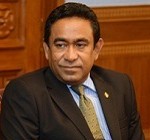After a protracted election period plagued by annulments, controversy, and multiple delays, on 16 November 2013 the Maldives finally elected Abdulla Yameen Abdul Gayoom as the country’s president. With this, the nearly two-year long political turmoil in the island archipelago may have come to an end.
Abdulla Yameen won 51.3% of the vote to beat the frontrunner, former President Mohamed Nasheed. In the first round, Nasheed had won with 47% of the vote, but fell short of the 50% required for an outright victory.
The final run-off election, which was originally scheduled for November 10, was delayed by six days. After Nasheed’s first round victory, Yameen had refused to sign the voter’s registry as required by Supreme Court guidelines for the elections to proceed. The resultant delay meant missing the constitutional deadline of November 11 to swear in a new president. However, it bought sufficient time for Yameen to enter into a last minute coalition with business tycoon Gasim Ibrahim, who won 23% of the vote in the first round – and ultimately ensured Yameen’s victory.
Yameen’s election marks the return of the Gayoom clan to power. Five years ago, in November 2008, Maumoon Abdul Gayoom’s 30-year long autocratic rule ended after he was defeated in the first democratic elections in the country’s history.
Now, Abdulla Yameen, who is Maumoon Abdul Gayoom’s half-brother, has appointed more family members to his Cabinet. Gayoom’s daughter Dunya Maumoon is Yameen’s Foreign Minister, while Gayoom’s son Ahmed Faris Maumoon has been appointed State Minister for Economic Development.
Other notable Cabinet appointments include Defence Minister Mohamed Nazim, who also held the same portfolio in the Mohamed Waheed Hassan Manik regime, and was amongst the most powerful members of Waheed’s Cabinet. Nazim was prominent actor in the ouster of the Mohamed Nasheed regime in February 2012, which sparked the recent crisis.
Nazim’s appointment has been followed by high-profile dismissals from the Maldives National Defence Force (MNDF). Several mid- to high-ranking military officials have been suspended, demoted, or dismissed in what the opposition Maldivian Democratic Party claims is a politically motivated purge of the military.
In a statement with ramifications for press freedom, the defence ministry on November 30 also declared it unlawful for media outlets and citizens to criticize or question the “lawful dismissals.”
Umar Naseer – a prominent critic and rival of Abdulla Yameen, who made public statements alleging Yameen’s control of street gangs and drug rackets, and hinted at his involvement in the brutal murder last year of MP Afrashim Ali – was made the Home Minister, as part of the agreement with Gasim Ibrahim’s Jumhooree Party.
The right-wing Islamist Adhaalath party got two Cabinet portfolios – the Ministry of Islamic Affairs, and the Ministry of Housing and Infrastructure.
The president also appointed former Deputy Commissioner Hussain Waheed as the new Police Commissioner, after former Commissioner Abdulla Riyaz resigned to work on a full-time political career as a candidate for the ruling coalition.
Abdulla Yameen has pledged to focus on the country’s economy, which has nose-dived in two years of unrelenting political instability. The dollar crisis continues unabated in a country largely dependent on imports for everything, from oil to food stuffs.
To manage a sustainable recovery, Yameen will have to ensure the stability of his coalition and government. After less than a month, however, the Adhaalath party has announced that it is formally exiting the coalition, while retaining support for the government.
Yameen also has the task of repairing ties with India, which were severely strained following the heavy anti-India rhetoric of his coalition partners. It had resulted in the acrimonious annulment in November 2012 of the $500 million 25-year contract signed with Indian infrastructure giant GMR to develop and operate Malé’s International Airport by the Nasheed government.
In the ensuing fallout, the Indian government froze the third instalment of a $100 million standby credit facility. It also tightened visa restrictions for Maldivians, who frequently travel to India for education and medical purposes.
India was also perceived, like other major powers, to be backing Nasheed in the elections. The coalition parties – which made up Waheed’s government – tilted towards closer ties with China and advocated these ties in their campaign speeches.
However, the anti-India rhetoric has taken a backseat after the election campaign. India has made diplomatic overtures to the newly-appointed president, including the unfreezing of a $55 million instalment of the standby credit facility.
President Yameen has been invited by Indian Prime Minister Manmohan Singh for a visit. He will embark on this first official trip abroad on 23 December 2013.
In the run-up to the meeting, both countries have made statements indicating a willingness to improve bilateral ties and to move closer in defence ties.
It will be a balancing act now for Yameen’s government, between repairing relationships with its larger neighbour, which are necessary to pursue his economic pledges, while also keeping his nationalist allies happy.
Yameen Rasheed is a Malé-based commentator on the politics and society of the Maldives.
This article was exclusively written for Gateway House: Indian Council on Global Relations. You can read more exclusive content here.
For interview requests with the author, or for permission to republish, please contact outreach@gatewayhouse.in.
© Copyright 2012 Gateway House: Indian Council on Global Relations. All rights reserved. Any unauthorized copying or reproduction is strictly prohibited


